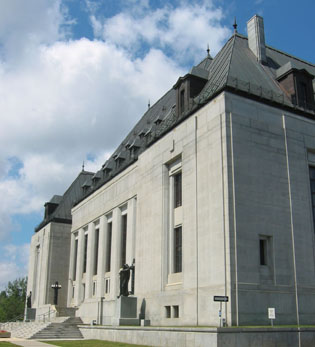A Supreme Court of Canada ruling that administrative monetary penalties don’t offend constitutional rights because they are not criminal in nature could open the doors to greater use by government bodies.
 While Guindon v. Canada dealt with a tax case, the decision has implications for securities law, the Competition Act, telecommunications, and other instances in which the government is pursuing AMPs against professionals including lawyers and accountants.
While Guindon v. Canada dealt with a tax case, the decision has implications for securities law, the Competition Act, telecommunications, and other instances in which the government is pursuing AMPs against professionals including lawyers and accountants.
Four of the seven SCC judges reached the decision which was released July 31, while the other three declined to deal with the issue, ruling the constitutional argument shouldn’t be considered because Julie Guindon, the lawyer who launched the appeal, failed to give proper notice to federal and provincial authorities.
The case involved adviser penalties found under s. 163.2 of the Income Tax Act, which imposes monetary penalties on anyone who makes false statements that could be used by another person for the purpose of the act.
Guindon is a lawyer practising mostly family and estate law. In September 2001, she gave a legal opinion about the Global Trust Charitable Donation Program. At the time, she signed the opinion she had not reviewed the documents she said she had relied on.
The program involved a tax reduction scheme that involved the donation of vacation ownership weeks in a timeshare.
The taxpayers would donate the undervalued VOWs to a registered charity and, in return, receive charitable tax receipts in the amount of the fair market value of the VOWs.
It was later revealed that no timeshare units were ever legally created and no VOWs were actually donated to charity. The only charity to become involved in the program was Les Guides Franco-Canadiennes District d’Ottawa, a registered charity that Guindon was president of from 1999 to 2004. On Dec. 31, 2001, 135 tax receipts were signed by Guindon and the charity’s treasurer.
The CRA assessed adviser penalties of $546,747 against Guindon. The SCC’s decision from last week means she must now pay the AMP.
Peter Aprile, of Counter Tax Lawyers in Toronto, has been watching the case as it moved through first the Tax Court, then the Federal Court of Appeal.
“What was interesting to me was listening to the statements the CRA was making at various accounting conferences through all of this,” says Aprile. “We know the CRA wanted to get the word out there about the possibility of substantial fines being levied in the civil context without having to cross over to criminal prosecution.”
During the Guindon appeal period, Counter Tax Lawyers filed an access to information request just before the Federal Court of Appeal released its decision to determine how many penalties the CRA had issued.
In March 2013, its research revealed the CRA had issued 77 s. 163.2 penalties to tax preparers, planners, and promoters totalling approximately $119.5 million. There were 47 on-going audits and 14 of those involved tax preparers and 33 were tax promoters (i.e. promoters of tax shelters).
As at April 11, 2014, the CRA approved 93 proposals to assess the penalty and chose not to issue assessments related to 21 s. 163.2 penalties. As at May 2011, 19 promoters and 27 tax preparers had been assessed $65.5 million, and audits of 52 promoters and 23 preparers were underway. No penalties had been reversed at the objection stage.
The 2014 Auditor's General report indicates that the median penalty is $440,000.
Between 2000 and 2007, the CRA had only issued nine assessments. In 2012, it issued 19 assessments. Between the Federal Court of Appeal decision and the SCC decision the numbers jumped to $137 million in penalties. All assessments were stuck at the objection level while Guindon went through the courts.
“Two things are happening,” says Aprile. “The CRA has held every other one in abeyance pending resolution of Guindon, and so we will start seeing those move through the courts. And it’s obvious with the Federal Court of Appeal decision, the CRA gained some confidence it would stand the test of the Supreme Court.
“I have little doubt we are going to see more imposition of these penalties as well as more activity in the court to determine what rises to the level of culpable conduct and what an appropriate due diligence defence will look like.”
Aprile says the threat of penalties will have a chilling effect.
“I think the CRA is using the threat of this as a pretty good tool to change behaviour even in instances in which behaviour shouldn’t or doesn’t need to be changed,” he says.










